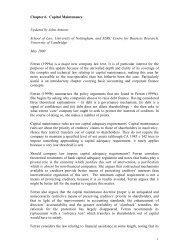From Exuberant Youth to Sustainable Maturity - DTI Home
From Exuberant Youth to Sustainable Maturity - DTI Home
From Exuberant Youth to Sustainable Maturity - DTI Home
Create successful ePaper yourself
Turn your PDF publications into a flip-book with our unique Google optimized e-Paper software.
"When you look at the level of complexity of some of<br />
the games coming out of the UK, you often have <strong>to</strong><br />
have 5 years of experience in playing games <strong>to</strong> work<br />
out how <strong>to</strong> play them" [Expert]<br />
Games are therefore frequently produced by<br />
hardcore gamers for hardcore gamers. They are in<br />
turn reviewed by devoted gamers in the press.<br />
As console and PC penetration increases and price<br />
points drop, the potential audience is growing in size<br />
and diversity. Targeting these users is becoming<br />
increasingly important. As with TV and film, games<br />
companies may be able <strong>to</strong> reduce risk and increase<br />
the chances of market success by diversifying and<br />
producing populist or mass market titles; the industry<br />
is beginning <strong>to</strong> do this with licensed products - e.g.<br />
EA /Argonaut's Harry Potter, Blitz's Chicken Run.<br />
License owners also typically have clear ideas on<br />
their target demographics which will help drive<br />
design and implementation for the mass market.<br />
There is a fear, however, that this involves a loss of<br />
creativity - this is debated as some interviewees take<br />
the view that more creativity is needed <strong>to</strong> create a<br />
great game within the constraints of a licence than<br />
from an original concept.<br />
However, greater awareness of the console cycle<br />
and the demographics of the user groups would<br />
certainly help; very little research is done in this area<br />
by developers, and publishers rarely see games that<br />
tie in with their strategies or the nature of the console<br />
cycle.<br />
Lack of comprehensive global market data<br />
The most comprehensive UK data is Chart-Track<br />
data. This is expensive (but heavily discounted <strong>to</strong><br />
ELSPA members) and has suffered from recent<br />
moves by EB <strong>to</strong> reduce detail in weekly statements.<br />
In addition <strong>to</strong> being UK-specific, Chart-Track data<br />
covers retail figures only.<br />
The Screen Digest reports provide useful aggregated<br />
data, but focus mainly on the UK market. It is<br />
therefore of limited use <strong>to</strong> developers and publishers<br />
who are targeting international markets. There is no<br />
clear source of easily digestible data that takes a<br />
global perspective - companies have <strong>to</strong> collect,<br />
correlate and compare data sources for individual<br />
markets, such as Screen Digest and GfK for the<br />
UK/Europe, the CESA white paper for Japan and<br />
NPD for the US.<br />
UK COMPETITIVENESS SUMMARY<br />
Many developers and publishers rely on information<br />
decanted down the value chain <strong>to</strong> keep them up <strong>to</strong><br />
date. This does not give an accurate comparative<br />
picture of their position, and also reinforces an ou<strong>to</strong>f-date<br />
view of the characteristics of game player<br />
demand. It is also very useful <strong>to</strong> be able <strong>to</strong> check<br />
these figures against independent data in order <strong>to</strong><br />
remain confident of their accuracy.<br />
Lack of comprehensive consumer data<br />
There is little available data tracking consumer<br />
demographics or consumer behaviour in using<br />
games. Currently, most information gained by the<br />
industry is garnered from registration cards, included<br />
in games packages, completed by self-selected<br />
respondents. This does not give a sufficiently<br />
detailed picture of demand characteristics. Forrester<br />
consumer surveys are another example of industry<br />
data, but the level of detail included in the surveys is<br />
not sufficiently high. As games are rapidly becoming<br />
mass-market products, it is important <strong>to</strong> know and<br />
understand the people who are playing games. This<br />
data would be extremely useful <strong>to</strong> the industry as a<br />
whole.<br />
Lack of comprehensive industry data<br />
While information is available on public companies,<br />
(typically larger ones such as publishers and retailer),<br />
through company and investment analyst reports,<br />
there is a lack of available detailed data on<br />
developers in general. This is chiefly because few of<br />
them are listed. Some data on UK developers is<br />
available from sources such as Companies House,<br />
the data is highly variable in detail. Information on<br />
overseas developers is even harder <strong>to</strong> obtain.<br />
Lack of communication (and trust) within the<br />
industry<br />
Relationships along the value chain have his<strong>to</strong>rically<br />
been difficult; lack of transparency, poor<br />
communication and management have affected the<br />
level of trust between players. Increased focus on<br />
professionalism, project and business management<br />
throughout the value chain, and the implementation<br />
of more formal systems of communication should<br />
help strengthen these relationships.<br />
Competitiveness analysis of the UK games software sec<strong>to</strong>r Main report 27
















